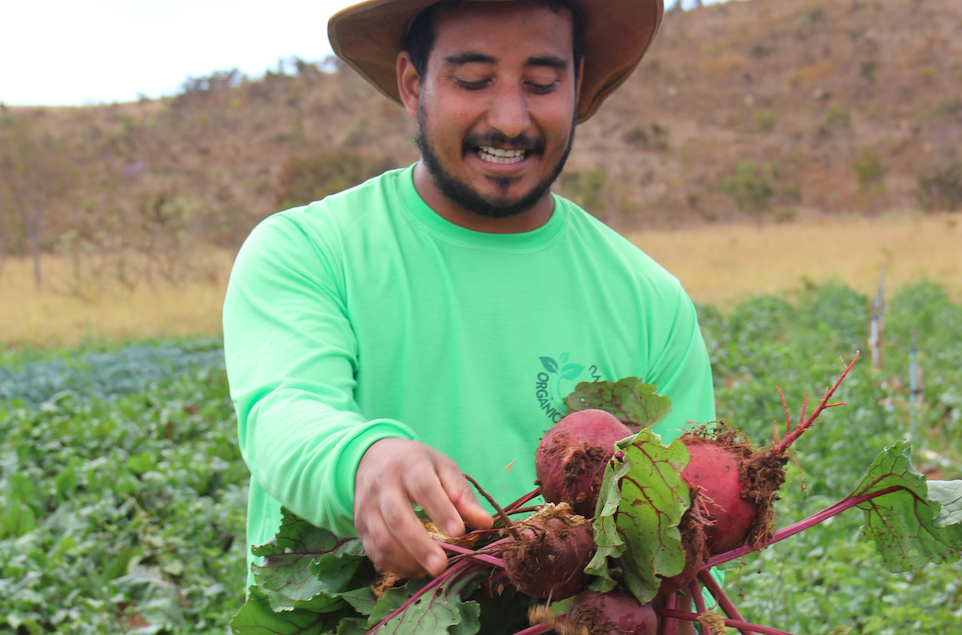
Regenerative school feeding, using agroecological products, is the focus of a pilot project that the Rockefeller Foundation wants to launch in public schools in three cities in Brazil, in partnership with the WFP Centre of Excellence against Hunger in Brazil, the Food of Tomorrow Institute, national institutions and the Brazilian government. This proposal was presented at a series of meetings held between 27 and 29 January in Brasilia.
To kick off the project, the Rockefeller Foundation’s Director of Food, Peiman Milani, and its programme manager, Federico Bellone, were at the Centre of Excellence, where they presented the proposal and learned about Brazilian initiatives.
“Brazil is a global benchmark in school feeding. But there are several Brazils within Brazil. Here is a place where there is room to evolve, with the idea of agroecological or regenerative school feeding. The school feeding programme would become an inducer supporting the agro-ecological transition,” said Peiman.
The pilot project should take place in 3 or 4 municipalities in the same territorial area, lasting between 3 and 4 years. “This is a long-term initiative, involving an international consortium of partners who share a common understanding of the transformative potential of school feeding through agroecology,” stated Peiman.
In addition to Brazil, two other countries will have their own pilot projects: Indonesia and Kenya. The Rockefeller Foundation’s intention is to support the countries to collectively reach more than 100 million children with school meals by 2030.
Partnership
The WFP Centre of Excellence against Hunger in Brazil participated in the design of the Rockefeller Foundation’s new global initiative.
“We are already in a collaborative partnership. In the pilots, we want the Centre of Excellence to participate with its experience in school feeding and nutrition. But also, in the role of dissemination, of visibility, creating a bridge for multimodal innovation. Brazil has some interesting innovations. The idea is for the Centre of Excellence to evolve into an information hub, helping to cross-pollinate with other countries that want to implement these changes,” stressed Peiman Milani, from the Rockefeller Foundation.
He added that the Foundation envisages the Centre of Excellence participating in technical assistance to support cooperatives and producers in the transition.
For Daniel Balaban, director of the WFP Centre of Excellence against Hunger in Brazil, this joint work brings the component of climate resilience to the issue of food production from family farming supplied to school meals.
“Reinforcing agroecological practices in school feeding through mutual collaboration allows us to build a more inclusive and resilient food system, promoting a sustainable future for all,” said Balaban.
Regenerative agriculture
The idea of creating a school feeding pilot with agroecological products is to encourage the practice of regenerative agriculture, which takes into account natural systems such as soil, biodiversity and water resources in local agriculture, and which brings benefits to human health.
“It’s a sustainable production system integrated with nature that gives farmers a greater capacity to adapt to climatic events and greater resilience to the climate, and students access to more nutritious and healthy food,” explained Peiman.
Agenda
The agenda of meetings organised by the Centre of Excellence included meetings with representatives from the Ministry of the Environment and Climate Change, the Ministry of Foreign Affairs, the Ministry of Agrarian Development and Family Farming, the National Health Foundation, and institutions focused on sustainable agriculture.
The next steps include defining the municipalities where the pilot projects will be implemented. The criteria will be to work in municipalities where agroecological transition is a priority.
“We’re going to take advantage of the political moment, with a new crop of mayors. We’re going to engage 3 to 5 municipalities to start the process of co-creating the design of the pilots to implement the project from 2026. The intention is that in four years’ time, the mayors will have concrete results to present,” concluded Peiman.




